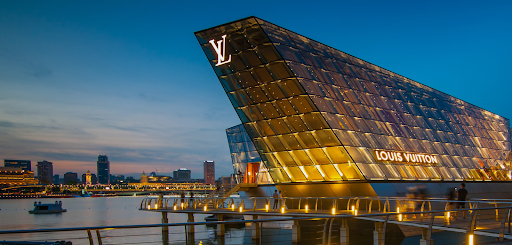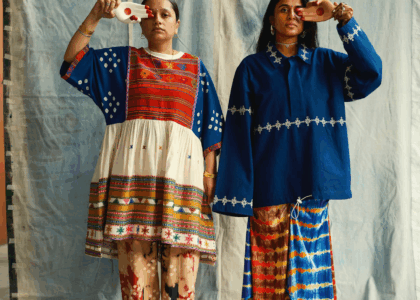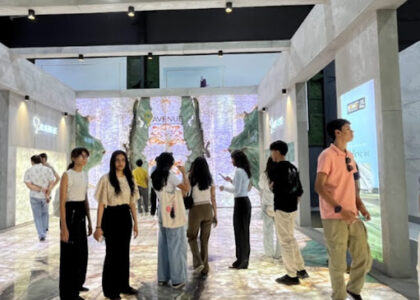What is Corporate Training in luxury brand ?
Corporate training is more than just skill-building—it’s about shaping professionals who can carry a brand’s legacy forward. In luxury brand management, it goes beyond standard training to instill an in-depth understanding of brand heritage, exclusivity, and the nuances of catering to high-net-worth clients. The luxury industry is fast-paced and constantly evolving, and well-trained employees ensure a brand remains at the forefront of excellence and innovation. Unlike generic training programs, luxury brand training focuses on building emotional intelligence, mastering the art of exclusivity, and creating an unparalleled customer experience

From mastering the art of personalized service to understanding global luxury trends, employees gain the expertise needed to uphold and enhance a brand’s reputation. Training also includes learning about craftsmanship, sustainability, and digital transformation—essential components of the modern luxury landscape.
Why do luxury brands need to invest in training?
Luxury brands aren’t just selling products; they’re selling an experience, a lifestyle, and a status symbol. The expectations are higher, and the competition is fierce. To maintain and strengthen their position, luxury brands must ensure their workforce is equipped with the right skills and mindset. Here’s why continuous training is essential:
- Enhancing Customer Experience: Luxury shoppers expect impeccable service and exclusivity. A well-trained team understands the psychology of affluent clients and can create lasting relationships that drive brand loyalty. From understanding a customer’s lifestyle to anticipating their needs, trained professionals can deliver tailored experiences that exceed expectations. For example, at Louis Vuitton, sales associates undergo specialized training in personalized clienteling, ensuring that VIP customers receive bespoke recommendations and white-glove service.
- Maintaining Brand Consistency: Every touchpoint in a luxury brand’s journey must reflect its identity. Whether it’s a boutique in Paris or an online concierge in Dubai, training ensures employees uphold the brand’s heritage, tone, and aesthetics seamlessly. For instance, Chanel ensures its boutique staff worldwide follow strict guidelines on customer interactions and store presentation to maintain its signature elegance.
- Adapting to Industry Changes: The luxury sector is witnessing a shift towards sustainability, digital innovation, and experiential retail. Employees must be well-versed in new-age luxury trends such as NFTs, AI-driven personalization, and ethical sourcing to remain relevant and competitive. Brands like Gucci have incorporated sustainability training into their corporate programs, emphasizing responsible sourcing and eco-conscious craftsmanship.
- Building Leadership Pipelines: Strong leadership is crucial in luxury brand management. Training equips managers with strategic thinking and decision-making skills, preparing them for bigger responsibilities within the brand. Luxury leadership requires a mix of creativity, business acumen, and a deep appreciation for craftsmanship and heritage. Hermès, for example, has leadership training initiatives to groom store managers into global brand ambassadors who understand both business and artisanship.
- Boosting Employee Morale and Retention: Investing in employees’ growth makes them feel valued, leading to higher job satisfaction and lower turnover—an essential factor in an industry where expertise, relationships, and discretion play a critical role in maintaining a brand’s reputation. LVMH’s “INSIDE LVMH” program provides training and career growth opportunities for employees, fostering brand loyalty and internal mobility.
The real benefits of investing in employee developmentWhen a luxury brand prioritizes training, it reaps tangible benefits:
- Greater Employee Loyalty: Employees who see a brand investing in their professional development are more likely to stay committed and take ownership of their roles. In luxury, where personalized service is key, long-term employees create stronger client relationships.
- Improved Leadership & Performance: Stronger leadership means better decision-making, team motivation, and an overall improvement in service excellence. Trained managers can navigate challenges such as brand repositioning, crisis management, and market expansion with confidence.
- Higher Profitability: A well-trained sales team understands how to engage with ultra-high-net-worth clients, upsell premium products, and turn one-time buyers into lifelong patrons. They master the art of storytelling and experiential selling—two crucial components in luxury retail. For example, Rolls-Royce’s sales team undergoes exclusive training in storytelling and craftsmanship, enabling them to sell not just a car but an elite lifestyle.
- Stronger Brand Reputation: Luxury is about perfection, and well-trained employees ensure the brand maintains an elite, high-quality image. Knowledgeable staff can articulate the brand’s craftsmanship, history, and values with authenticity, reinforcing credibility and desirability. For instance, Cartier trains its sales teams extensively in the history and heritage of its iconic jewelry pieces, enhancing their ability to convey the brand’s legacy to clients.
- Future-Proof Workforce: Employees who receive continuous learning opportunities are more adaptable, innovative, and capable of leading the brand into the future. They can leverage digital advancements, interpret data-driven insights, and integrate omnichannel strategies to enhance the luxury customer journey. Burberry’s digital training initiatives ensure employees are equipped to provide seamless luxury experiences across physical and online platforms.
How does luxury connect elevate Corporate Training?
Luxury Connect stands out as a premier provider of corporate training for luxury professionals, offering:
- Custom Training Programs: Tailored courses that address everything from high-touch customer service to digital innovation in luxury retail. Programs focus on both traditional luxury values and modern technological advancements.
- Industry Experts as Mentors: Programs led by seasoned professionals who bring years of experience working with top luxury brands. Learners gain access to insider knowledge and best practices that can’t be found in standard business courses.
- Hands-On Learning: Practical case studies, role-playing scenarios, and immersive experiences that prepare employees for real-world challenges. Employees engage in simulated luxury client interactions, brand storytelling exercises, and product curation workshops.
- Leadership Development: Programs focused on executive presence, strategic planning, and decision-making for those moving into managerial roles. Training ensures leaders understand how to align the brand’s business objectives with its heritage, values, and future vision.

At Luxury Connect, we don’t just teach luxury—we live it. Our training programs go beyond theory, giving students hands-on experience in everything from high-touch customer service to digital innovation. We help them build strong personal brands with business photoshoots, profile-building sessions, and masterclasses led by industry experts.
Luxury is about attention to detail, exclusivity, and storytelling—and we make sure our students master it all. Whether you’re looking to step into the industry or take your career to the next level, The School of Luxury Retail is here to help you make it happen.





